Do Animals Have Pain When Giving Birth
Animal Moms Have It Tough! 8 Extreme Creature Births
Extreme births
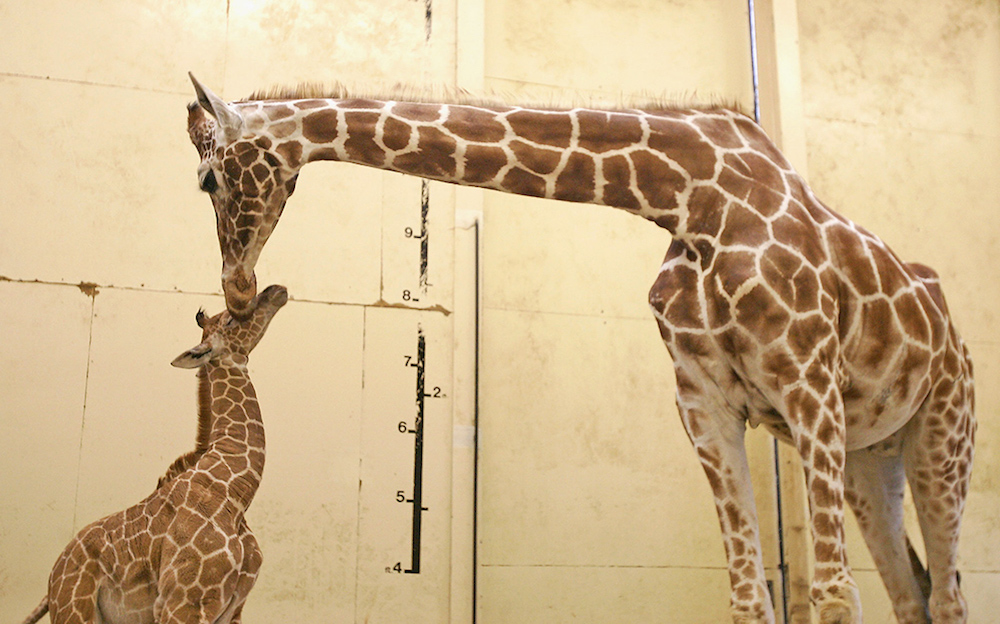
Giving birth to the next generation tin exist an extreme event for mothers (and, if you're a bounding main horse, fathers) in the animal kingdom.
In appreciation of all the mothers out there on Mother's Solar day, Live Science has compiled a list of the eight most farthermost fauna births. Read on to see cute creature babies, and to gain a new respect for the mothers who went through great feats to bring their children into this world.
Naked mole rats
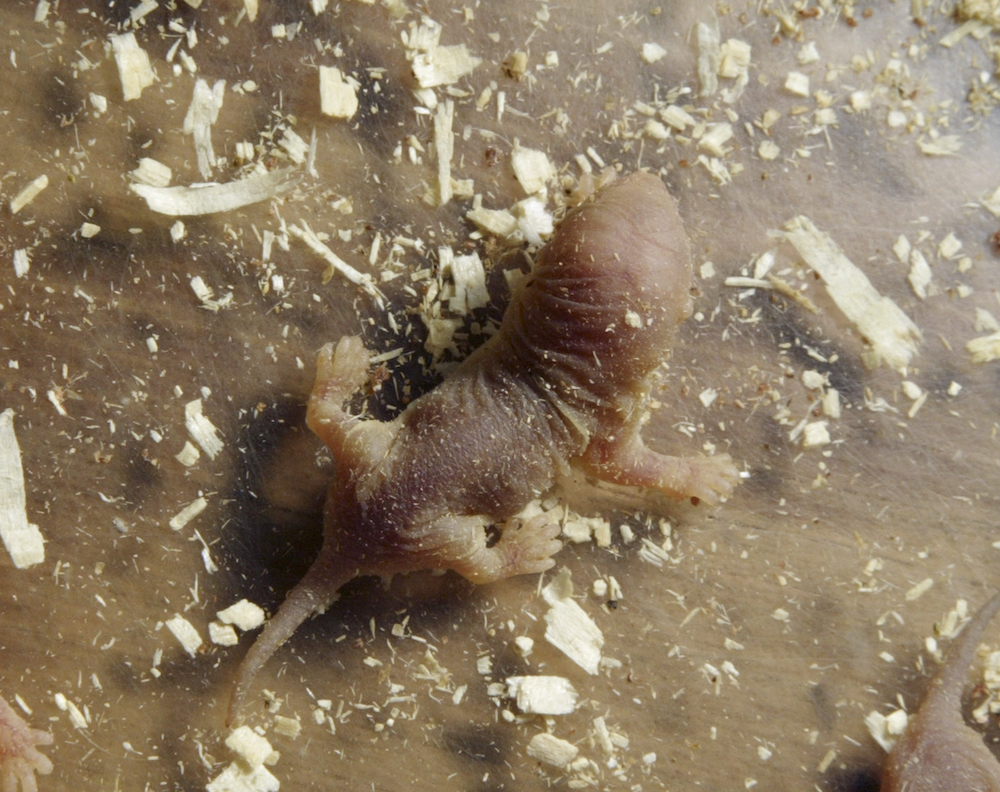
Naked mole rats (Heterocephalus glaber) are incredibly social mammals that alive in colonies. But each colony has just 1 reproductive female: the queen.
She isn't part of a family line, even so. Rather, if some other female person wants to get queen, "she has to get upwardly to the current queen and kill her," said Kenton Kerns, the assistant curator of pocket-sized mammals at Smithsonian'south National Zoo in Washington, D.C.
One time she becomes queen, the matriarch starts having babies, commonly about 10 to 15 at a time, which is fairly like to the number of pups birthed by other rodents, such equally mice or rats. However, the number of the litter grows over time. That'southward because naked mole rats are the only mammals whose bones grow after they reach adulthood, Kerns said.
"Every time the [queen] gets meaning, her intervertebral disc space — the space betwixt her vertebrae on her spine — volition become just a tiny fleck bigger, and so bigger and bigger every time she has a litter," Kerns told Live Scientific discipline.
At her height, the queen can give nascency to a litter of 33 babies, each about the size of a "robust kidney bean," he said. This litter size is the largest of any mammal on Earth, Kerns said.
Prehensile-tailed porcupine
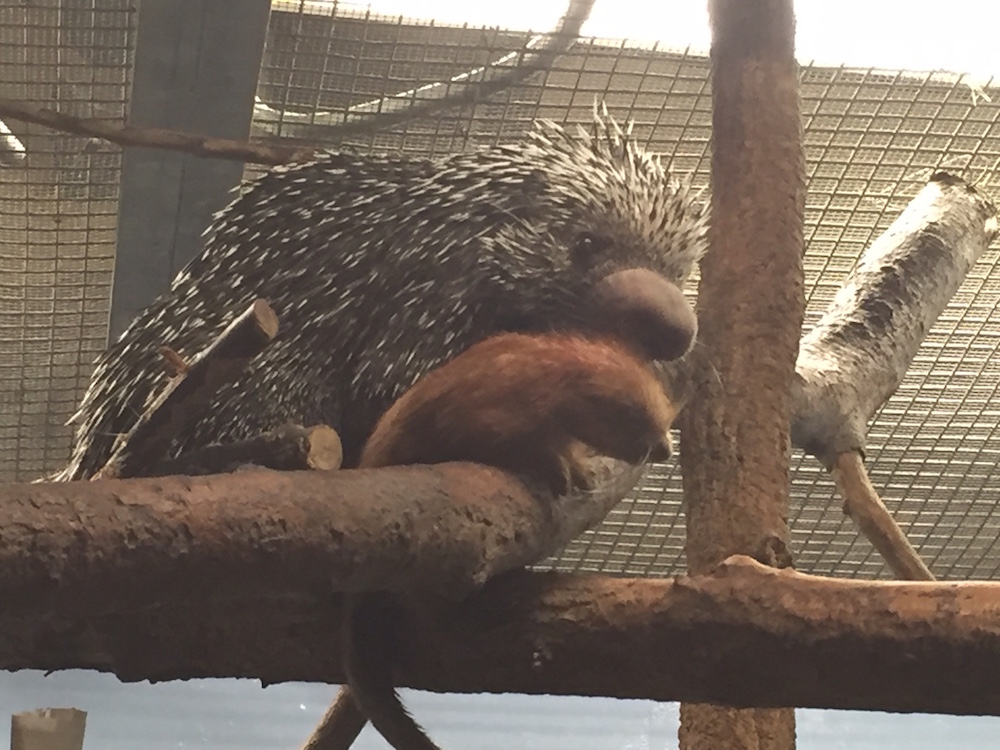
The prehensile-tailed porcupine (Coendou prehensilis) from South America goes through 2 extreme events during birth. For starters, these porcupine babies are born fully quilled. The quills are soft in the womb, merely harden in one case exposed to air. However, giving birth can be difficult, especially if the babe is born breech (bottom start), Kerns said.
The second extreme factor comes from the place of the birth: a tree. Kerns said he has never seen a newborn porcupine fall out of a tree, just information technology likely happens in the wild occasionally.
"The final one we had here [at the National Zoo], we watched him cling for dear life onto a branch while the umbilicus was coming off," Kerns said.
Tenrec
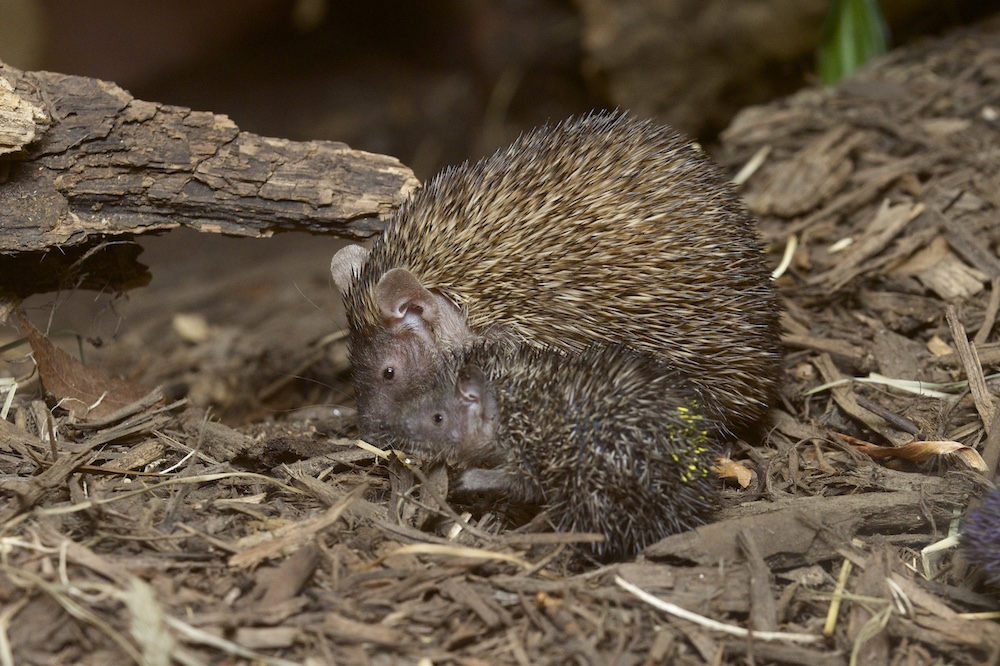
The tiny tenrec looks like a cantankerous betwixt a shrew and a hedgehog, but it is neither. In fact, this animal is more than closely related to the elephant than to either of these animals.
Tenrecs are covered with spines. Unlike the porcupine, whose quills take barbs that can get stuck in the peel of predators, the tenrec keeps its spines its unabridged life.
However, but like the porcupine, the tenrec mother must give birth to a spiky baby. The spines are soft in the womb only harden once they hit the air, as with the porcupine. But the prehensile-tailed porcupine usually has simply i baby at a fourth dimension. Tenrecs have between two and x babies per litter, which is a lot of spikes to bargain with, Kerns said.
Brusque-eared elephant shrew
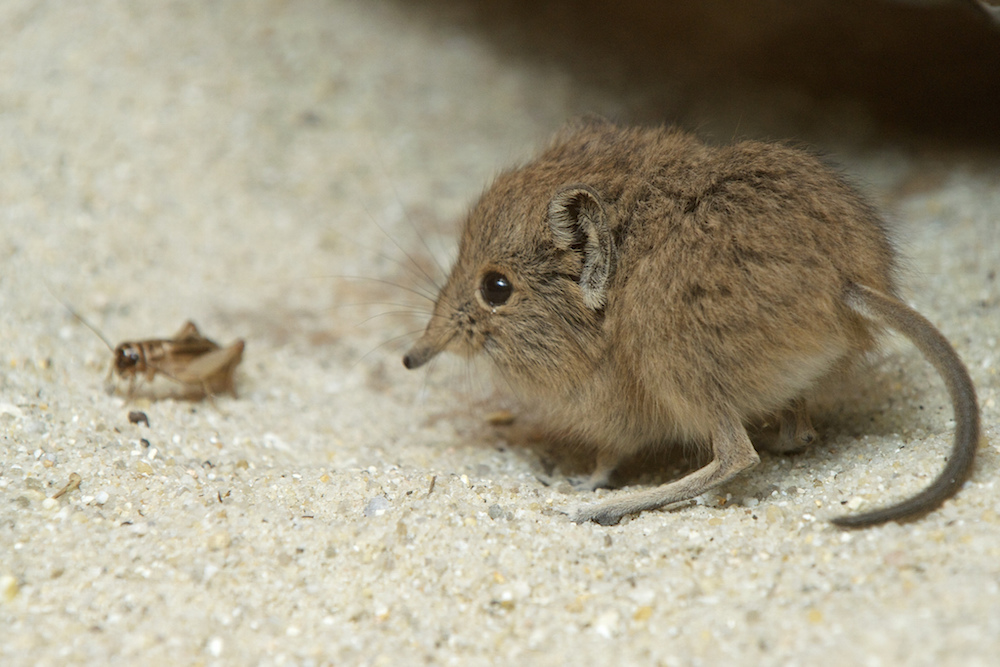
The short-eared elephant shrew (Macroscelides proboscideus) is tiny; information technology measures most 4 inches (10 centimeters) long and weighs no more than than 1.v ounces (43 grams), according to the National Zoo.
But Mom's weight can increase by 50 percent when she has ii babies. Each newborn weighs almost 0.iii ounces (10 g), and then a litter of 2 would weigh nigh twice that.
"Think about existence 40 g [originally] and having 20 grand [0.vii ounces] worth of baby," Kerns said. "That is one-half of your torso weight when you lot're not pregnant that y'all just gave nascency to."
Giraffes

The giraffe'due south nativity is farthermost because of the long drop the babe takes the moment it enters the outside world.
In a typical giraffe nativity, the baby's front end hooves poke out of the mother first, followed by the nose and head. Subsequently about thirty to 60 minutes of labor, the mother pushes the baby out. Then, the calf unceremoniously drops about 6.five anxiety (ii meters) to the basis, making a terrific thud.
Information technology might sound inhumane, but the fall is necessary. Information technology ruptures the amniotic sac, allowing the babe to start breathing on its own, Laurie Holloway, a spokesperson for the Dallas Zoo, told Alive Science in 2011.
Spotted hyenas
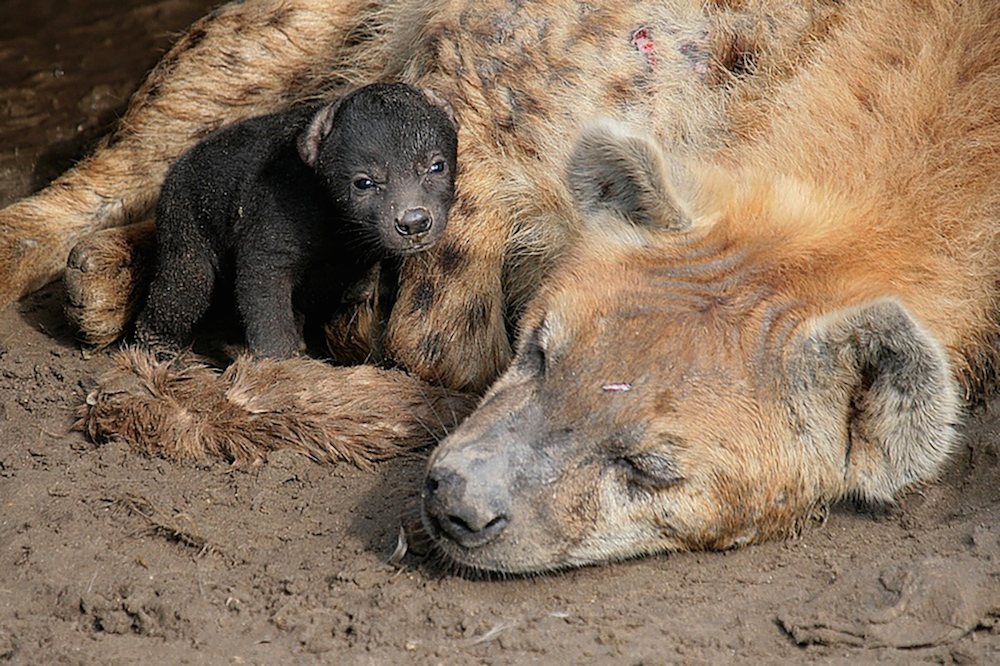
Spotted hyena births are non for the faint of heart. In the final stages of pregnancy, high-ranking female spotted hyenas (Crocuta crocuta) betrayal their fetuses to high levels of androgen, a male sex activity hormone linked to assailment, Live Science previously reported.
This extra androgen tin can make the pups more aggressive, giving them an edge over their peers, merely it can besides cause the mother's reproductive organs to abound. For example, the clitoris, which contains the birth culvert, can extend 7 inches (eighteen centimeters) from the body, Kay Holekamp, a professor of integrative biological science at Michigan Country University, told Live Science in 2006.
"Imagine giving birth through a penis," Holekamp said. "It's actually weird genitalia, but it seems to work. Although giving nativity through a 'penis' isn't a trivial problem."
What'southward more, the hyena'south birth canal is simply an inch (2.5 cm) in diameter, and a two-lb. (0.9 kilograms) pup can rip through the tissue every bit it exits the female parent. Poor Mom can die from these rips, every bit is evidenced by the high death rate among first-fourth dimension hyena mothers, Live Science reported.
Kiwis
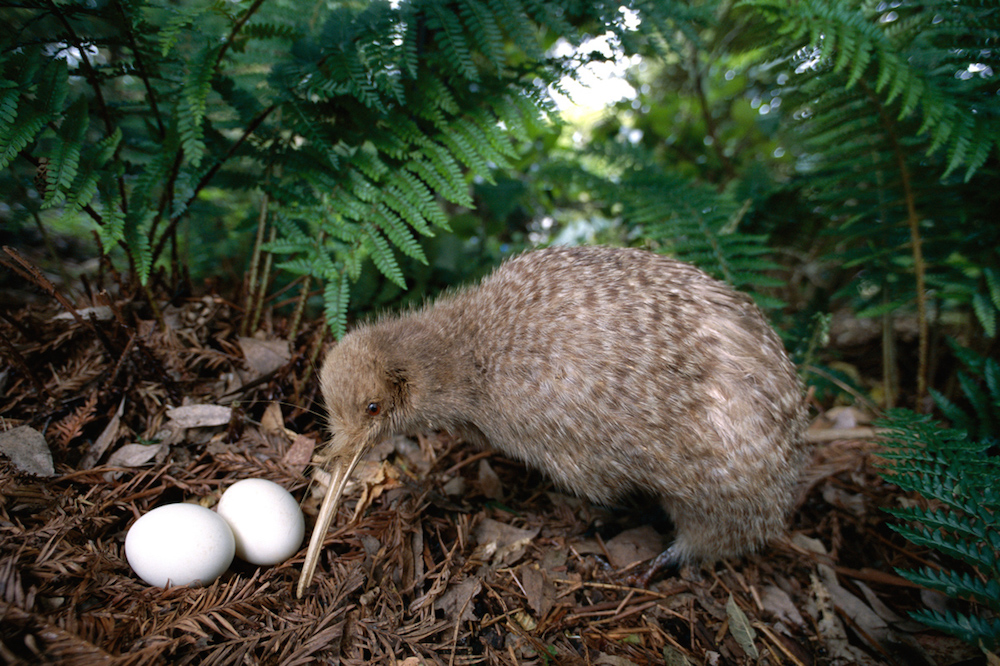
The kiwi's egg occupies upwardly to 25 percent of its female parent'south body, making information technology the largest egg, proportional to trunk size, of whatever bird in the world, according to the American Museum of Natural History (AMNH) in New York City. That'southward one egg-treme egg to lay!
Due to the egg'southward size, kiwi birth is equivalent to a chicken laying a one-lb. (0.4 kg) egg or a human being giving nativity to a four-year-sometime child, according to Audubon.
Luckily, there's an upside to mom'due south big load. The egg is and then large that the babe is fairly developed by the fourth dimension it hatches, according to the AMNH.
Humans

Humans can also accept extreme births. For one thing, it can be fatal to the mother: About 830 women dice from preventable causes related to pregnancy and childbirth every mean solar day, according to the Earth Health Organization (WHO). However, access to wellness care is improving, the WHO said. Between 1990 and 2015, maternal mortality dropped by about 44 percent worldwide, the WHO reported.
Even when it's not mortiferous, human birth can exist extreme for the female parent. Women who get into labor experience contractions, a tightening of the uterus that works to push the babe down the nascence canal, according to the American Pregnancy Association. Their cervix dilates, and then they push button until they adios both the baby and the placenta.
If a cesarean (C-section) is needed, doctors will make an incision through the abdominal and uterine walls and then that the physicians tin can pull out the baby, the association said. In the United States, about 32 percent of all births are C-sections, according to the Centers for Disease Control and Prevention.
Homo babies need a lot of TLC — tender love and care. Simply they can help make a loving family … and mayhap fifty-fifty a Mother'due south Solar day bill of fare if they retrieve when they're older.
Source: https://www.livescience.com/59094-extreme-animal-births.html
Posted by: pendletonexagagaidid.blogspot.com


0 Response to "Do Animals Have Pain When Giving Birth"
Post a Comment